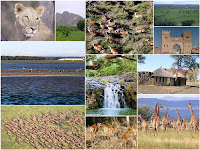Human Trafficking and Poverty
A few days ago, I read a very disturbing report on the BBC! The story of the sixteen-year-old Kenyan girl, used as a captive sex slave, and when she became pregnant and useless to her captors, she was abandoned. Apart from the money her captors had made out of her, she had suffered "imprisonment, beatings and systematic rape".
This is just: one story. But there are many - thousands, could be millions, just in the same situation like the sixteen-year-old Kenyan girl. Many, would never get out of that situation.
From Himalayan villages to Eastern European cities, people - especially women and girls - are attracted by the prospect of a well-paid job as a domestic servant, waitress or factory worker. Traffickers recruit victims through fake advertisements, mail-order bride catalogues and casual acquaintances.
Upon arrival at their destination, victims are placed in conditions controlled by traffickers while they are exploited to earn illicit revenues. Many are physically confined, their travel or identity documents are taken away and they or their families are threatened if they do not cooperate. Women and girls forced to work as prostitutes are blackmailed by the threat that traffickers will tell their families. Trafficked children are dependent on their traffickers for food, shelter and other basic necessities. Traffickers also play on victims' fears that authorities in a strange country will prosecute or deport them if they ask for help.
In April, 2004, the BBC reported: The trafficking of human beings is a problem in every African country, says the United Nations Children's Fund (Unicef). The report, which covers 53 African nations, says children are the biggest victims in what is a very complex phenomenon. It describes how they are forced into slavery, recruited as child soldiers or sold into prostitution. In Africa, children are twice as likely to be trafficked as women.
As always, it is women and children who are the main victims. And as always, the main perpetrators of such despicable, inhuman acts and crimes are: men. Men, who are supposedly the main protectors and carers, of women and children. Shame on us men! What a shame. What can be worse than using the weakest: children and women, to 'make a living'.
The rising incidence of trafficking in women and children was the theme at last Thursday's continental conference of Ministers of Justice of ECOWAS and Economic Community of African States( ECCAS,) at Abuja. Note: a 2006 Global report on child labor pointed out that Sub-Saharan Africa has the highest rate of children engaged in economic activities of all regions of the world.
Poverty. Undoubtedly, it is poverty that drives people to such sad and at times horrific, situations. Poverty can demoralize and weaken even the strongest and those full of pride. Make one so desperate that many times, these women and children - willingly and knowingly, accept such situations. Only, if our World is rid of poverty - can we control human trafficking and slavery.
This is just: one story. But there are many - thousands, could be millions, just in the same situation like the sixteen-year-old Kenyan girl. Many, would never get out of that situation.
From Himalayan villages to Eastern European cities, people - especially women and girls - are attracted by the prospect of a well-paid job as a domestic servant, waitress or factory worker. Traffickers recruit victims through fake advertisements, mail-order bride catalogues and casual acquaintances.
Upon arrival at their destination, victims are placed in conditions controlled by traffickers while they are exploited to earn illicit revenues. Many are physically confined, their travel or identity documents are taken away and they or their families are threatened if they do not cooperate. Women and girls forced to work as prostitutes are blackmailed by the threat that traffickers will tell their families. Trafficked children are dependent on their traffickers for food, shelter and other basic necessities. Traffickers also play on victims' fears that authorities in a strange country will prosecute or deport them if they ask for help.
In April, 2004, the BBC reported: The trafficking of human beings is a problem in every African country, says the United Nations Children's Fund (Unicef). The report, which covers 53 African nations, says children are the biggest victims in what is a very complex phenomenon. It describes how they are forced into slavery, recruited as child soldiers or sold into prostitution. In Africa, children are twice as likely to be trafficked as women.
As always, it is women and children who are the main victims. And as always, the main perpetrators of such despicable, inhuman acts and crimes are: men. Men, who are supposedly the main protectors and carers, of women and children. Shame on us men! What a shame. What can be worse than using the weakest: children and women, to 'make a living'.
The rising incidence of trafficking in women and children was the theme at last Thursday's continental conference of Ministers of Justice of ECOWAS and Economic Community of African States( ECCAS,) at Abuja. Note: a 2006 Global report on child labor pointed out that Sub-Saharan Africa has the highest rate of children engaged in economic activities of all regions of the world.
Poverty. Undoubtedly, it is poverty that drives people to such sad and at times horrific, situations. Poverty can demoralize and weaken even the strongest and those full of pride. Make one so desperate that many times, these women and children - willingly and knowingly, accept such situations. Only, if our World is rid of poverty - can we control human trafficking and slavery.


